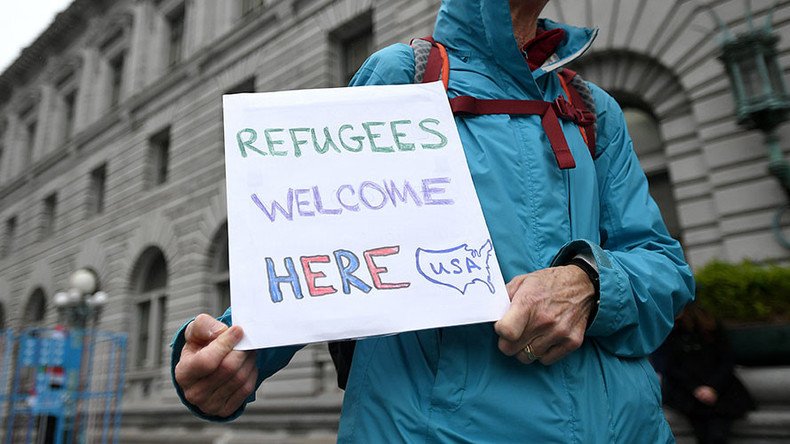Halt on Trump travel ban upheld by 9th Circuit Court

The restraining order on enforcement of the travel ban on seven countries has been upheld unanimously by a three-judge panel of the US 9th Circuit Court of Appeals. The case will likely continue to be appealed until it reaches the Supreme Court.
"We hold that the government has not shown a likelihood of success on the merits of its appeal, nor has it shown that failure to enter a stay would cause irreparable injury, and we therefore deny its emergency motion for a stay," the appeals court's decision said.
Trump responded on Twitter in all caps, saying, "SEE YOU IN COURT, THE SECURITY OF OUR NATION IS AT STAKE!"
SEE YOU IN COURT, THE SECURITY OF OUR NATION IS AT STAKE!
— Donald J. Trump (@realDonaldTrump) February 9, 2017
Government lawyers were put to the test by the three-judge panel, arguing in favor of enforcing the travel ban while litigation over it is ongoing.
The 9th Circuit Court was not ruling on whether the order was constitutional or not. The issue at hand was whether it would be enforced while legal challenges made their way through the judicial system.
Large parts of the executive order had been suspended by US District Judge James L. Robart in Seattle, who incurred President Trump’s fury on Twitter. Trump called him a “so-called judge” who “opens up our country to potential terrorists” and puts the country in “peril.”
The opinion of this so-called judge, which essentially takes law-enforcement away from our country, is ridiculous and will be overturned!
— Donald J. Trump (@realDonaldTrump) February 4, 2017
Because the ban was lifted by a judge, many very bad and dangerous people may be pouring into our country. A terrible decision
— Donald J. Trump (@realDonaldTrump) February 4, 2017
Trump’s gripes with the judicial branch of government were echoed by DOJ lawyer August E. Flentje. When asked on Tuesday by Judge Michelle T. Friedland whether he was arguing “that the president’s decision in that regard is unreviewable,” Flentje responded in the affirmative.
Washington Solicitor General Noah Purcell, who also represented Minnesota, seemed to express similar feelings when he argued to keep the travel ban in place by telling the appeals court that if they did not “abdicate” their check on the executive branch, they would “throw the country back into chaos.”
The three judges also argued amongst themselves over whether or not the travel ban on seven predominantly Muslim countries constituted a Muslim ban. Judge Richard Clifton argued that the countries affected by the executive order “encompass only a relatively small percentage of Muslims.”
"I have trouble understanding we're supposed to infer religious animus," he said.
Washington State argued against the DOJ and claimed that the ban was based on religion after former Trump advisor, Rudy Giuliani, claimed on Fox News that Trump had asked him how to pass a legal Muslim ban.
Wash.: Well, the Pres called for complete bans on Muslims entering the country. That's what adviser said on TV. #WAvTrump
— Brian Goldman (@briangoldman) February 7, 2017
Wash.: We can infer animus from public statements of Pres and top advisers -- intent to ban Muslims. #WAvTrump
— Brian Goldman (@briangoldman) February 7, 2017
Washington also cited the many lawful permanent residents who were impacted by the executive order, some of whom were detained in airports after trying to reenter the country legally. While the executive order has since been rewritten to exclude lawful permanent residents, Washington argued that it was a sign of “bad faith.”
Wash.: Cases say you can look behind order to find motives where there are allegations of bad faith, which we have here. #WAvTrump
— Brian Goldman (@briangoldman) February 7, 2017
The ruling was nearly guaranteed to be appealed up to the Supreme Court from the get-go, due to both sides' commitment to the subject, as well as the national interest in it.












